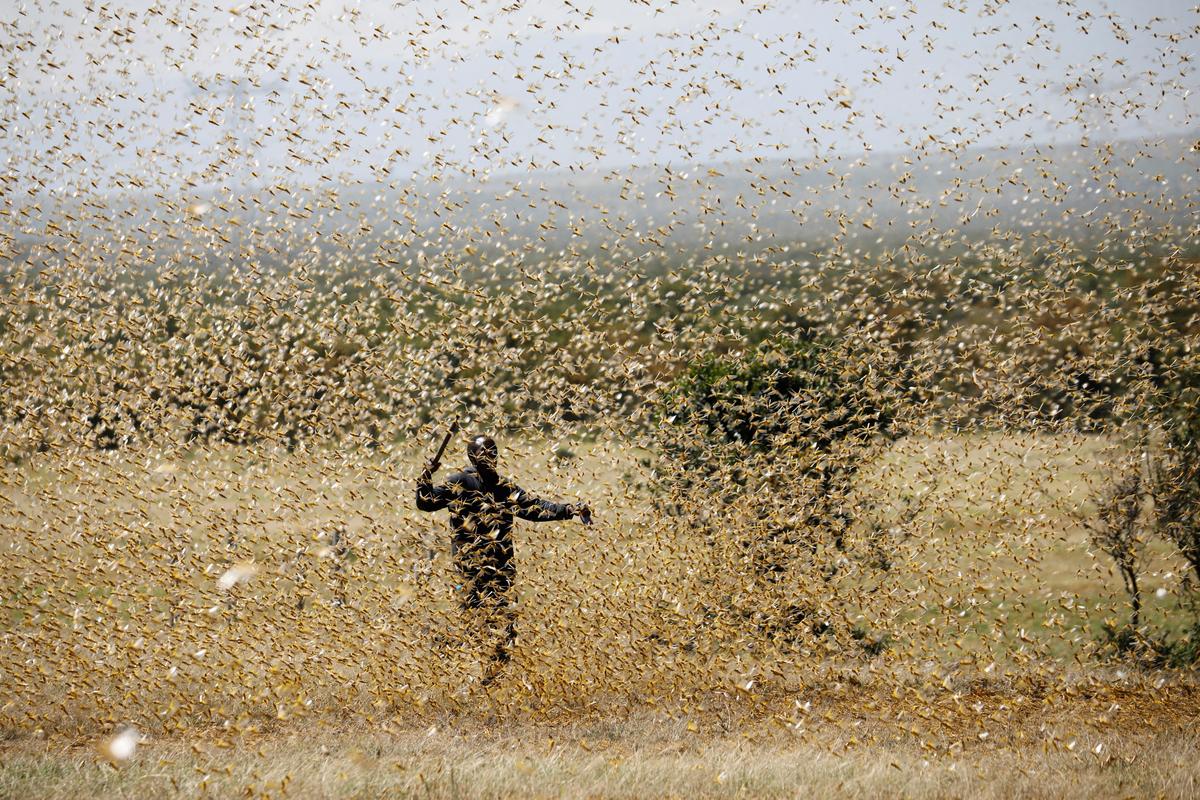KATHMANDU: The farmers of Nepal are horrified at the potential revisit of locust after 70 years.
Already hit by coronavirus-induced lockdown, the farmers are panicked at the idea that all damaging swarms of locust might enter Nepal from the western part of Nepal and spoil the crops.
The farmers fear that once entered in the fields in Nepal, the hoppers can spoil most of the crops leading many parts to food crisis and starvation.
Agro- experts also fear that the corona struck economy might collapse provided the locust swarms in India enter Nepal and launch their destruction campaign.
The locust has already damaged many parts of India including Delhi and Uttar Pradesh of India.
Nepal, as in coronavirus transmission case, is highly vulnerable from the locust induced crisis approaching via India.
Dr. Dilli Ram Sharma, former Director-General of the Department of Agriculture told Khabarhub that if entered in Nepal the locust might spoil the crops of many districts of Sudur Pashchim Province.
What is locust?
Locust is a short-horned grasshopper. Generally a solitary insect, under certain circumstances they change their behavior and habits and turn destructive.
Drought followed by the rapid vegetation growth makes plays catalyst in the production of serotonin in their brains, which changes their nature making them more gregarious and voracious. Generally, its hazard is high in deserts or desert-like plains.
The swarms of locusts can travel great distances and destroy the vegetation wherever they land. Each swarm consists of more than 40 million insects in it. Nepal had witnessed the locust attack 70 years before.
“There is nothing specific for the locusts to eat, wherever they see something green, they land there and spoil it all,” former DG Sharma, “some insects target specific plants or crops, but locusts spare nothing green.”
Locusts spoil the 35000 people’s food in 4 hrs
Sharma told Khabarhub that the swarms spoil the crops enough for the food of 35000 people in 3-4 hrs.
“These insects can travel about 150 km at a time and can finish the food of 35000 people in 3-4 hrs,” Sharma shared.
According to him, the insect has been in India for long.
“The locust induced terror is not new to the farmers in India, it was there long before,” he added “it was noticed in India in 1812 AD. It used to come up to UP, but, it has already come to Northpark of UP and is likely to enter Nepal soon.”
He deems coordination with India a must as the locusts enter Nepal via India.
Technical team formed as preliminary preventive work
Ministry for Agriculture and Livestock Development has formed a technical team for the prevention of the hazards the locusts might cause.
Hari Bahadur KC, the spokesperson at the Ministry said that it has formed the technical team to study the probability of the locusts’ arrival and the measures to be adopted to mitigate the risks.
“We are discussing the risks and measures to be taken against the destructive insects,” spokesperson KC told Khabarhub, “the team will prepare the specific action plan we have to adopt in case they enter Nepal.”
Mitigating measures
The government should adopt specific plans to prevent the locusts from arriving in Nepal. A special task force should be formed instantly to start concrete preparation.
The persons like former DG Sharma can be a resource for the team as some people like him have got the experience of observing the damage and the measures taken to control them in many countries.
“There are some people who have studied about the locusts and the damage caused by them in countries like Cambodia and Lava,” he said, “I have also learned about the mitigating measures.”
He thinks it important for all levels of governments to make an emergency plan to counter these insects as plans help people prepare to face and tackle them.
“Time flies on wondering what to do and by that time the locusts finish all the crops,” he added, “these insects offer us no chance to wait and see; we have to act in a pro-active way.”
“Preparedness with the legal provisions, necessary tools, the methods, the manpower to be mobilized, the insecticides, etc. should be there in advance,” Sharma added talking about some activities to be done instantly, “ many countries use planes to spray insecticides; though we don’t have such means we can use the drones.”
The farmers should be alert
The farmers who spend most of their time in fields should observe the movement of the insects. They should keep on watching whether the new insects are there. In case something devastating appears, they should instantly inform the governments, local, province, or federal whichever possible.
Not only the farmers, the police in borders, now deployed for border security should coordinate in blowing alarm whistle against these inform; for it, they should inform the concerned authority instantly.
“The farmers, the customs, the authorities in the quarantine, etc can help by providing the instant information, they should forward the information to the local, province or federal government at the earliest,” Sharma added. “Although farmers alone can’t control the insects, they play a pivotal role in the network,” he said.
He feared that provided the locusts to enter Nepal during such a pandemic outbreak, the loss will be too heavy for the country like this.
Agreeing with Keith Cressman, the FAO’S senior locust expert he said that such an outbreak can have untold effects on food security, leaving smallholders even more vulnerable than before and jeopardizing the economic outlook for recovery in the affected countries,” he explains.









Comment